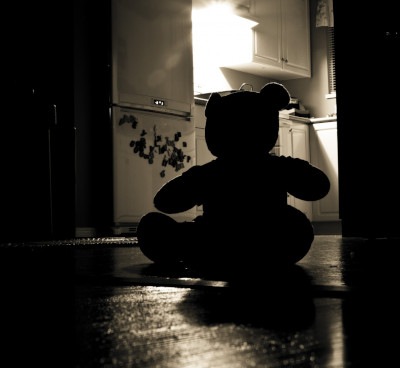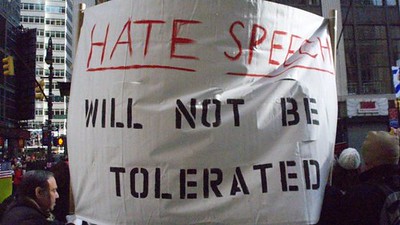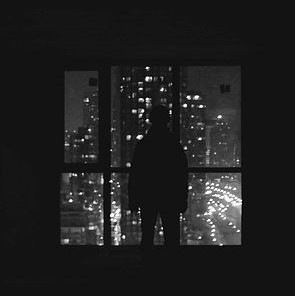Don’t platform bigots, racists, conspiracy theorists, etc. We hear it often. The rationale? Free speech doesn’t mean you’re free from consequences. The attention spreads hateful and false information. These statements are true to a point, but I don’t think we’re doing ourselves any favours. I’d go so far as to argue that the silence is potentially far more harmful.
Babushka, Dedushka, & a Legacy of Silence
Babuska was known for her endless love of family, bingo, plastic flowers, and the colour blue. But I remember her for something much darker.
One late summer evening, we ran to my grandparent’s place after receiving an odd phone call. We arrived to hear dedushka ranting in the backyard just like all the men in my family did. My mother and I tiptoed silently by to the house where babushka sat on her chair, trying desperately to pretend that she wasn’t crying.
She insisted that she had “fallen down the bee again.” Still, it was clear from the considerable amount of bruises, the black handprints, and a palpable shame wafting in the air that she hadn’t fallen. We did our best to comfort her, but our job was to stay silent like we always did, just like the neighbours did. Just like the town did. It was the dirty little secret we carried until well after babushka passed away years later.

I don’t remember ever having a conversation about these things. It was something I instinctually understood. It was deeply ingrained in my identity. The importance of silence, accepting marriage’s price, and choosing my battles stuck with me well into adulthood.
I stayed quiet while listening to racist tirades that would make the KKK proud. A man regularly belittled and verbally abused someone every time he needed to make himself feel better, and I said nothing. I’ve also been on the receiving end. I’ve had things happen, and no one said anything.
It wasn’t until a few decades later that I understood how wrong these things were when I became immersed in a completely new community and social circle. And while I know now, it does nothing to lessen the guilt and responsibility I feel. I’ll never be able to make any of those things right. Not for babushka. Not for me. Not for those who were hurt. Not for anyone.
Pretending these things don’t exist doesn’t make them go away or reduce their harm. Uncontested and unchallenged, these social diseases grow and fester, passing from one person to the next, generation to generation, until they become badges of honour. They’re something dedushka took comfort in and would happily brag about in the right company. And it’s a legacy that has only become more prominent among members of my old life.
“The only thing necessary for the triumph of evil is for good men to do nothing.”
Edmund Burke
A History of Ignoring Evil
Silencing and ignoring harmful opinions or attitudes isn’t a new tactic. Societies have been arguing about “giving them a platform” for ages. In 1988, Margret Thatcher gave a famous speech to the American Bar Association on the topic. In it, she demanded the media stop reporting on terrorism and the rising IRA violence. “[W]e must try to find ways to starve the terrorist and the hijacker of the oxygen of publicity on which they depend.”
The ban went into place a short time later, and nothing improved. The violence continued until the UK government repealed the ban weeks after the IRA’s 1994 ceasefire. The media found loopholes, and people talked about it anyway. Opposition parties used the ban as proof that Thatcher and her conservatives were more interested in controlling free speech and silencing opposition than ending the violence.
China has used state-run media and successfully controlled public speech for decades until the Internet became a common good. And that’s the problem with refusing to platform racists, conspiracy theorists, and other shitty attitudes. It doesn’t achieve the goal and has a myriad of downsides.
A Place for Everyone and Everyone in Their Place
It was far easier to silence society’s uglier sides before the Internet and smartphones. There used to be fewer options controlled by a small number of companies, and the risks of going against the government or society’s beliefs had severe consequences. For example, it was a crime to be gay. And if you printed lies, you were far more likely to get sued into oblivion. Today, however, anyone can publish anything. It doesn’t even have to be true. You might endure some public shaming or lose a job, but it’s easy to find another audience or another job.
Misinformation and disinformation campaigns are almost impossible to control. And despite the efforts of places like Google, Facebook, and Twitter, no one is sure where to draw the line. If a government outlaws specific content, there are hundreds of ways to circumvent the law. And the arrival of the Streisand effect ensures that nothing on the Internet ever truly goes away.
By chasing bigots, racists, conspiracy theorists, and unsavoury characters to the Web’s darker corners, we make it easy for these movements to grow in echo chambers, unquestioned and unchecked. In fact, by limiting them to their own worlds, members of these sects can easily forget that their ideas aren’t normal or acceptable.
Some argue that de-platforming fragments false messages and makes people with these vile views harder to find. This opinion is somewhat accurate. It was one of Hitler’s critics’ problems when they tried to stop the dictator’s rise to power. However, word-of-mouth and social sharing are still very much a thing.
Suppose people feel out of place, in need of answers, and rejected by the rest of society. In that case, they’ll actively seek out platforms popular with more accepting people. The genuine feelings, opinions, and reasoning behind these hateful attitudes are still there, unaddressed and festering under the surface. These individuals will still be vicious or cruel. And even worse, they’ll get sneakier about it.
Platforming vs Addressing Alternative Behaviours and Beliefs

When we choose to do nothing, we are still actively making a choice. And I get it. It’s easier for some of us to pretend racists, conspiracy theorists, or others don’t exist, especially when it’s painful. Humans actively avoid uncomfortable situations. But here’s the thing: If we ignore them, it’s because we have the privilege of doing nothing. The people they hurt aren’t nearly as lucky. Confronting these problems head-on is the only way we can solve them. And to do this, you have to listen first.
Recognizing and calling out behaviours such as racism has become a prominent strategy. Still, we seem to forget that we try to de-platform others. To make matters worse, demanding you be heard while preventing the other side from speaking becomes hypocritical and a point of contention. It’s exclusionary instead of inclusive. And it proves to the other side that you’re guilty of the same things you’ve accused them of doing. It’s another reason for the racist, conspiracy theorist, or bigot not to listen to anything you say.
Do I think we should have the CBC Racist Hour or a Global Conspiracy Theory Gospel daily? Absolutely not. Allowing conspiracy theorists, bigots, and racists to spew their garbage unquestioned is disgusting and dangerous. Balanced reporting isn’t going to help us in many situations, either. To do so, you have to validate both sides without question. Instead, we need to explore and discuss the issues for the betterment of society.
No Real Danger in Exploring the Dark Side
Radicalization is a serious problem, but that’s all the more reason to address the topics. Take The Breakdown’s interview with John Carpay or Ryan Jespersen’s interviews with individuals like Drew Barnes and Danielle Smith. Each one caused a fair amount of emotionally charged controversy. Why?
John Carpay is fighting the Alberta Government over Covid restrictions. He has a history of homophobic statements and other horrifying comments. Drew Barnes is an unapologetic separatist and a regular spreader of false information. Danielle Smith has historically provided a platform for incorrect information and radical ideas like hydroxychloroquine as a Covid cure. She’s defended those accused of racism and far-right ideations. But, unless the guest goes on a horrific racist rant or starts calling for violence, interviewing prominent local figures like these, in the way that The Breakdown and Jespersen did, doesn’t have risks.
First, their audiences aren’t generally raging racists or conspiracy theorists, so they’re unlikely to suddenly start buying into the guest’s concepts. Some of the listeners of these shows may be unsure of what their opinion is. There’s no risk here, either.
Both hosts pushed back and questioned at least some of the blatant falsehoods, while the guests had no counterarguments to speak of. And in some instances, the guests demonstrated an inability to understand a topic, a complete failure to perform due diligence, or in one example, lacked empathy, compassion, or consideration for others. So, it’s unlikely that any listeners still on the fence would suddenly start believing the guest’s falsehoods
The guests also brought with them some of their existing followers. This group already buys into these ideas and supports harmful behaviours. Hence, there’s no risk the guests will persuade them. I’d argue that it may be one of the rare chances their followers have to hear challenging opinions or the truth. After all, you can’t know something if the fact never comes up. You may not even realize it’s a “controversial” fact. And it’s not like our government or AHS have been a great source of reliable, clear, and concise information.
Worst case, the guest’s followers think the show and its host are jerks and never return. Oh well. At best, however, the exposure to the truth starts adjusting their opinions and views. (More on this in another post.)
There are other benefits, too. Interviews like these can add to the show’s trust levels. Viewers can see that the host is willing to explore these situations, hold guests accountable, and do their research. The conversations didn’t run off the rails and get confrontational. In short, they were respectful discussions between individuals who disagree.
Finally, interviews with controversial guests give viewers a chance to understand how conspiracy theorists, theories, and radicalization work. It’s not only fascinating for those who think differently, but it gives you the ability to know where they’re coming from. You can gain insights into what arguments they make, how they become convinced of these ideas, and why they may be open to them or seeking alternative answers. You can use this information to have a real, genuine conversation with those closest to you who may think similarly to the guests. And we’ve all seen how many of their supporters use the same reasoning and “proof.”
Radicalization Depends on Silence

Abusive husbands frequently isolate their spouses. Cults separate their members from the rest of society. Racist, conspiracy theorist groups, and survivalists operate outside regular communication circles. Isolation allows movement leaders to control their followers’ messages, avoid judgment, and prevent anyone from speaking up. The group socially polices dissent.
When we stay silent and avoid “platforming” these groups, we play right into their hands. Even worse, by clearly labelling someone as “other,” the “dark” groups use these instances to show their members how they’re vilified for being themselves and feeling the way they do.
At a recent freedom rally in Calgary, organizers made blatant use of this tactic to explain that “tiki torches aren’t racist.” They invited BIPOC attendees to light the torches themselves to show the crowd that they’re not racist. Speakers explained how “Antifa” is using the torches to smear the entire group and make the march into something it’s not. And you know what? For many of those people, it probably wasn’t a racist rally.
Some attendees are fighting against inconsistent rules and decision-making that are directly impacting their lives. In their minds, they’re not racists. And because they’ve never had to worry about racism, they have no idea what tiki torch rallies and other symbols mean. These attendees certainly don’t intend to mean racist things, so, therefore, they’re not racist in their minds. They genuinely don’t understand and are now called racists, nazis, and haters fighting against the government.
Are the rallies or media events racist? Yes. Are many of the attendees openly racists and conspiracy theorists? Absolutely. But here’s the thing: The racist leaders and organizers in the group don’t care.
Individuals using their channels, rallies, and public speaking engagements for the most hateful and greedy purposes use cognitive dissonance and the obliviousness of others in the crowd to gain a voice and gain power. And that’s all that matters to them at the moment.
The rest of society isolates group members, so it will be much easier for organizational leaders to convince attendees to support more hate-filled opinions later. And because the racists are “protecting” the group and offering a safe haven. In contrast, others call them awful names, attendees are even more willing to accept what the speakers say. The lesson here? These events and movements can’t be silenced, and you can’t bully them into submission, either.
Healthy discussions such as personal chats and respectful interviews in a neutral place have to happen. But you can’t pretend these things aren’t happening. Silence works. It worked for the IRA. It worked for dedushka. And now, silence is working for those following in their footsteps. Are we going to stay silent like we were taught?
